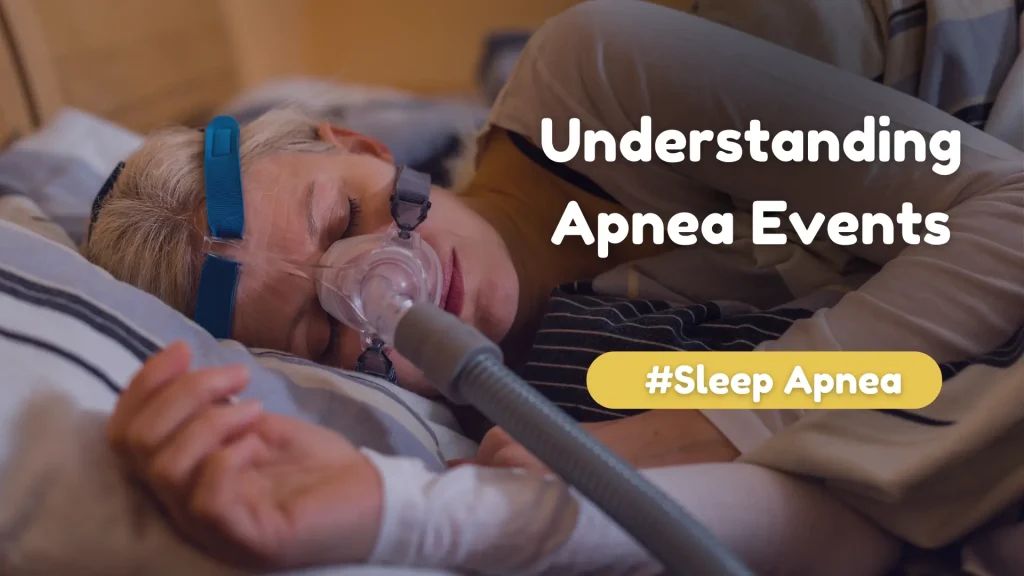Posted on Thursday, March 21st, 2024 at 8:37 pm
It can be upsetting to wake up and suddenly realize that you’re not breathing, a health condition known as sleep apnea. There are also cases where people stop breathing in sleep or have shortness of breath upon waking up. However, many people with sleep apnea don’t even know they have a problem.
As far as they know, they get a good night’s sleep every night, but they can’t stop feeling sleepy during the day regardless. Their partner may be the only one who even suspects something is wrong due to the constant loud snoring.
Understanding apnea events and how to address the medical condition can help restore peace of mind and improve your sleep.
What Are Apnea Events?
If you’ve woken up due to stopped breathing in your sleep, you may have experienced an apnea event. According to the Harvard Medical School, an “apnea” is an interruption in breathing during sleep. When you stop breathing in sleep, your body will wake you up, even if for just a moment, so you can start breathing normally again.
That can cause you to snore loudly or make choking noises as you fight to resume normal breathing.
Because you may only be awake for a moment, you may not remember waking up at all when, in fact, you may be waking up multiple times every night with sleep apnea. The same recent article published by the Harvard Medical School states that apneas can happen hundreds of times in a single night, and any individual apnea may last for 10 to 30 seconds.
Causes of Breathing Interruptions
According to the University of Rochester Medical School, causes of breathing problems include:
- The throat muscles become too relaxed during sleep, causing them to sag and obstruct the airway. This can then cause you to stop breathing sleep. This is the most common cause of obstructive sleep apnea.
- The airway becomes too narrow to let air flow in and out easily, usually due to excess weight gain. This is another cause of obstructive sleep apnea.
- The brain temporarily loses communication with the muscles controlling breathing. This is a case of central sleep apnea, which is relatively rare.
Regardless of the cause, breathing is interrupted, and the person with sleep apnea partially wakes up to resume proper breathing. They may make loud snoring or choking noises while resuming regular breathing. Because the person suffering from sleep apnea often wakes up multiple times a night, whether they remember it or not, the result is poor quality of sleep.
Warning Signs of Sleep Apnea
The most common warning signs of sleep apnea are snoring and sleepiness. Neither of these is enough to diagnose sleep apnea, as there can be other reasons for either snoring or sleepiness. However, if your partner tells you that you snore loudly while asleep, yet you find it hard to stay awake during the day, sleep apnea is a likely culprit.
Harvard Medical School suggests that you should visit a doctor and get checked out for sleep apnea. The doctor will likely ask you about snoring and sleepiness, check for any signs of a narrowed throat, and check how large your neck is. They’ll also take your blood pressure, as sleep apnea is associated with high blood pressure.
Consequences of Sleep Apnea
Repeated sleep interruptions can lead to a disgruntled partner and overall exhaustion. According to the University of Rochester Medical School, common consequences and risk factors of sleep apnea include:
- Sleepiness during the day
- Problems with blood pressure and irregular heartbeat
- Higher risk for heart diseases like heart attack and stroke
You may also experience some of the usual side effects of not getting enough sleep, from headaches to irritability. One of the most serious consequences of sleep apnea is inattentiveness due to sleepiness. Harvard Medical School warns that untreated sleep apnea can make you seven times more likely to be in a car accident. Sleep apnea is a problem with real and serious consequences.
Get Help for Better Sleep Today
If you suffer from sleep apnea, help is available. Various solutions, including comfortable oral appliances and continuous positive airway pressure (CPAP) machines, can help you overcome your sleep apnea and get the rest you need. To determine which treatment is right for you, make an appointment with a sleep clinic like Silent Night Therapy.
Stop keeping your partner awake all night with your snoring or struggling through the day because you’re too sleepy to function. Contact us online or call 631-983-2463 today to schedule a consultation. Our team of West Babylon sleep specialists can help with your sleep apnea.

